 24 citations,
June 2018 in “Expert Review of Pharmacoeconomics & Outcomes Research”
24 citations,
June 2018 in “Expert Review of Pharmacoeconomics & Outcomes Research” Microneedle technology is beneficial for drug delivery and could make vaccinations cheaper and more accessible.
 July 2021 in “British Journal of Dermatology”
July 2021 in “British Journal of Dermatology” Low testosterone levels may contribute to female pattern hair loss in men.
 3 citations,
May 2010 in “Victorian literature and culture”
3 citations,
May 2010 in “Victorian literature and culture” The conclusion is that advertising is a key part of "The Pickwick Papers," reflecting the consumer culture of Victorian Britain.
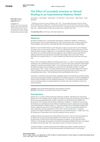 1 citations,
September 2023 in “Curēus”
1 citations,
September 2023 in “Curēus” Lavandula stoechas helps wounds heal faster in diabetic and non-diabetic rats.
2 citations,
December 2023 in “Pharmaceutics” Inhaling medicine may reduce side effects and improve treatment for a major lung cancer type.
 November 2024 in “Frontiers in Medicine”
November 2024 in “Frontiers in Medicine” Cirrhosis affects quality of life with various symptoms, requiring a holistic, multidisciplinary approach for management.
40 citations,
June 2021 in “Clinical, cosmetic and investigational dermatology” JAK inhibitors show promise in effectively treating hair loss from alopecia areata.
 April 2023 in “Clinical Chemistry and Laboratory Medicine”
April 2023 in “Clinical Chemistry and Laboratory Medicine” The document concludes that inflammation markers can be used in diabetes, vitamin D3 affects immune pathways, hyperthyroidism changes hormone levels, androgen levels help diagnose Adrenocortical Carcinoma, erectile dysfunction is linked to diabetes, hypogonadism is common in HIV-infected males, and hormones can be biomarkers for various conditions.
 1 citations,
April 2018 in “Lasers in Surgery and Medicine”
1 citations,
April 2018 in “Lasers in Surgery and Medicine” New treatments and technologies in laser medicine show promise for improving skin conditions, fat reduction, cancer treatment, wound healing, and hair restoration.
 30 citations,
April 2010 in “Cell Cycle”
30 citations,
April 2010 in “Cell Cycle” The gene p53 is crucial for removing damaged cells to allow for healthy tissue renewal.
 29 citations,
March 2008 in “Postcolonial Studies”
29 citations,
March 2008 in “Postcolonial Studies” The article concludes that the global hair trade is exploitative and reflects complex cultural and economic issues.
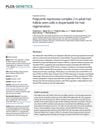 6 citations,
December 2021 in “PLoS Genetics”
6 citations,
December 2021 in “PLoS Genetics” Polycomb Repressive Complex 2 is not needed for hair regeneration.
 November 2022 in “Journal of Investigative Dermatology”
November 2022 in “Journal of Investigative Dermatology” Most patients with blistering skin disorders in South India had bullous pemphigoid and often had other conditions like hypertension and diabetes.
 November 2022 in “The journal of investigative dermatology/Journal of investigative dermatology”
November 2022 in “The journal of investigative dermatology/Journal of investigative dermatology” A patient with a new PLEC gene mutation showed symptoms of both muscular dystrophy and myasthenia gravis, which improved with steroid treatment.
 1039 citations,
February 2009 in “Nature Reviews Molecular Cell Biology”
1039 citations,
February 2009 in “Nature Reviews Molecular Cell Biology” Skin stem cells are crucial for maintaining and repairing the skin and hair, using a complex mix of signals to do so.
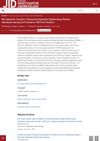 November 2022 in “Journal of Investigative Dermatology”
November 2022 in “Journal of Investigative Dermatology” Most Recessive Dystrophic Epidermolysis Bullosa patients with a specific mutation likely have Sephardic ancestry from about 500 years ago.
11 citations,
December 2013 in “Clinical and experimental dermatology” A child with skin and heart issues had rare genetic mutations affecting skin and heart cell cohesion.
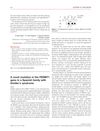 8 citations,
December 2009 in “Journal of The European Academy of Dermatology and Venereology”
8 citations,
December 2009 in “Journal of The European Academy of Dermatology and Venereology” Researchers found a new mutation in the FERMT1 gene in a Spanish family with Kindler syndrome.
 May 2021 in “Pakistan Journal of Medical and Health Sciences”
May 2021 in “Pakistan Journal of Medical and Health Sciences” Trichogram is useful for diagnosing hair disorders, but newer, non-invasive methods like trichoscopy are becoming more popular due to their sensitivity and ability to monitor treatment responses.
253 citations,
April 2008 in “Current opinion in cell biology” Notch signalling helps skin cells differentiate and prevents tumors.
 27 citations,
January 2018 in “Curēus”
27 citations,
January 2018 in “Curēus” Subcutaneous contraceptives can cause side effects like menstrual changes, headaches, weight gain, and pain at the implant site.
 4 citations,
April 1999 in “Dermatologic Clinics”
4 citations,
April 1999 in “Dermatologic Clinics” Long-pulsed ruby lasers effectively reduce hair for up to 2 years with minimal pain.
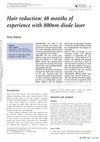 20 citations,
December 2003 in “Journal of Cosmetic and Laser Therapy”
20 citations,
December 2003 in “Journal of Cosmetic and Laser Therapy” An 800nm diode laser safely and effectively reduces hair for about 8 months, with most patients satisfied and few side effects.
11 citations,
March 2012 in “Journal of the American Academy of Dermatology” Most patients with dark skin were satisfied with laser hair removal and had few complications.
294 citations,
August 1999 in “Journal of the American Academy of Dermatology” Laser hair removal is safe with the right settings, but side effects like pain and skin changes are more common in darker or tanned skin.
49 citations,
January 2013 in “Dermatologic Therapy” Newborns with ichthyosis need specific care based on their skin type.
 April 2019 in “Journal of Investigative Dermatology”
April 2019 in “Journal of Investigative Dermatology” Skin grafts from related donors significantly healed chronic wounds in patients with a severe skin condition over a year.
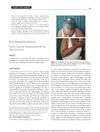 4 citations,
November 2012 in “Dermatitis”
4 citations,
November 2012 in “Dermatitis” A man got severe skin irritation after using marking nut sap for hair loss.
52 citations,
June 1998 in “British journal of dermatology/British journal of dermatology, Supplement” Ruby laser treatment is effective and well-tolerated for reducing hair growth.
1 citations,
January 2015 in “The Journal of Dermatology” Genetic testing is crucial for diagnosing and managing non-Herlitz junctional epidermolysis bullosa.





















